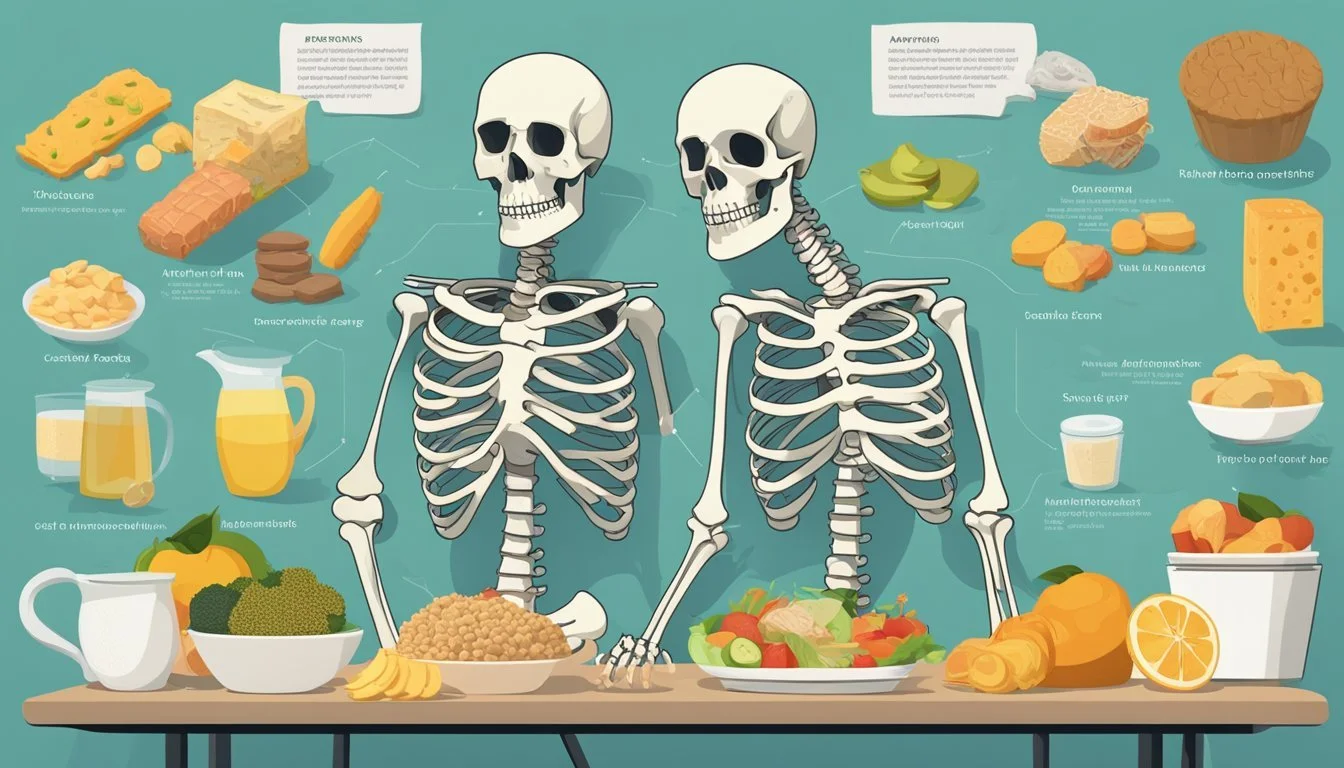Keto Diet and Bone Health
Uncovering the Connection
The ketogenic diet, commonly known as the keto diet, is characterized by high-fat, moderate-protein, and very low-carbohydrate intake. Its goal is to induce a state of ketosis, where the body burns fats rather than carbohydrates for fuel. This diet has gained popularity for weight loss and management, as well as for potential benefits in neurological conditions. However, its impact on bone health has come under scrutiny due to concerns that the diet may affect bone density and overall skeletal health.
Bone health is crucial for protecting the body against fractures and osteoporosis, particularly as individuals age. Bones require a balance of nutrients, including calcium and vitamin D, to maintain their strength and density. The keto diet’s restriction of certain food groups raises questions about its comprehensive nutritional adequacy and the possible implications of these restrictions for the skeletal system.
Research to date presents mixed results, with some studies suggesting that following a keto diet has negligible impact on bone mass density and markers of bone turnover, while other research indicates potential negative effects on bone health, particularly in athletes or those engaging in frequent exercise. It's vital to consider these outcomes and understand the mechanisms involved in how the keto diet may influence bone metabolism and long-term skeletal health.
Basics of the Ketogenic Diet
The ketogenic diet is a precise approach to nutrition that alters the body's fuel source from glucose to ketones, emphasizing high fat, moderate protein, and low carbohydrate intake.
What Is a Ketogenic Diet?
A ketogenic, or "keto," diet is a low-carb, high-fat eating plan designed to induce a metabolic state known as ketosis. During ketosis, the body becomes efficient at utilizing ketone bodies for energy instead of relying on carbohydrates.
Nutritional Components of Keto
The typical macronutrient distribution for a ketogenic diet is roughly 70-80% fat, 15-20% protein, and only 5-10% carbohydrates. The drastic reduction in carbs and increased fat intake lead to changes in energy metabolism, shifting the body into nutritional ketosis.
Fats: The cornerstone of the diet, including saturated, monounsaturated, and polyunsaturated fats.
Proteins: Consumed in moderation, essential for muscle maintenance.
Carbohydrates: Severely restricted to encourage ketosis; usually limited to green leafy vegetables and select dairy products.
Ketosis and Energy Metabolism
In the absence of glucose from carbs, the liver converts fatty acids into ketone bodies, an alternative energy source for the brain and muscles. This shift in energy metabolism is responsible for the potential weight loss and health benefits associated with the ketogenic diet. Achieving and maintaining a state of ketosis requires strict adherence to the macronutrient ratios and individuals often monitor their ketone levels through blood, breath, or urine testing.
Keto Diet and Weight Management
The Keto Diet is a strategic approach to weight management that emphasizes fat loss while aiming to preserve muscle mass. It operates by shifting the body’s energy source from carbs to fats, which facilitates weight loss in many individuals.
Benefits for Weight Loss
The Ketogenic Diet, particularly in its low-calorie and very-low-calorie forms, has been observed to promote weight loss. By significantly reducing carbohydrate intake and replacing it with fat, the body enters a state called ketosis. Ketosis is a metabolic state wherein the body becomes highly efficient at burning fat for energy, which can result in a decrease in body weight. Furthermore, due to the satiating effect of fats, individuals often experience a reduced appetite, which leads to a lower calorie intake and can thus support weight loss efforts.
Weight Loss: Individuals often experience a noticeable reduction in body weight when following a ketogenic diet.
Calories: A ketogenic diet reduces cravings and appetite leading to a lower calorie intake.
Obesity: For those suffering from obesity, the ketogenic diet has been shown to help reduce overall weight, which is vital for health improvement.
Keto's Impact on Body Composition
The composition of the body changes when a person follows a ketogenic diet. Studies indicate that while on a low-calorie ketogenic diet or a very-low-calorie ketogenic diet, fat stores are typically utilized for fuel, resulting in fat loss. There is a concern about the potential loss of muscle mass due to lower protein intake in some ketogenic diets, but diets that are well-formulated prioritize adequate protein to help preserve lean muscle.
Muscle Mass: Adequate protein intake on a ketogenic diet helps in maintaining muscle mass while losing weight.
Fat Loss: The primary aim of the diet is to achieve fat loss while minimizing the loss of muscle during weight reduction.
By focusing on the individual's intake of fats and proteins, the ketogenic diet aims to not just reduce calories but also to improve the overall body composition by increasing muscle definition and decreasing excess fat, which can have positive implications for long-term health management.
Bone Health Fundamentals
Maintaining bone health is crucial for overall well-being, involving a balance between bone breakdown and formation. This section will explore the underlying mechanisms of bone metabolism and identify key factors that influence bone mineral density.
Understanding Bone Metabolism
Bone metabolism is a continuous process of bone remodeling where old bone tissue is replaced by new. This consists of two main activities: bone resorption, the breakdown of bone tissue, and bone formation. Cells called osteoclasts are responsible for bone resorption, while osteoblasts facilitate bone formation. The balance between these two processes is essential for maintaining bone strength and mass.
Factors Affecting Bone Mineral Density
Bone Mineral Density (BMD) is a measurement of the amount of minerals (such as calcium) in a specific volume of bone. It is used as an indicator of bone strength and health. Several factors can affect BMD, which include:
Genetic factors: Certain genes are instrumental in determining an individual's peak bone mass and susceptibility to bone loss.
Age: Bone mass typically peaks during the third decade of life and gradually declines thereafter.
Hormonal levels: Hormones like estrogen and testosterone play significant roles in bone metabolism.
Nutrition: Adequate intake of calcium and vitamin D is essential for bone health.
Physical activity: Regular weight-bearing exercise stimulates bone formation.
Diagnostic tools like DEXA scans are used to measure BMD and assess the risk of osteoporosis, a condition characterized by low bone mass and deterioration of bone tissue. Monitoring levels of bone-specific markers, such as bone-specific alkaline phosphatase, can also provide insights into bone formation processes.
Impact of Diet on Bone Health
Diet plays a critical role in the maintenance of bone health, with specific nutrients being essential for bone strength and density. Certain diets can impact these nutrients, affecting the overall condition of the bone structure.
Keto Diet vs. High-Carb Diets
The ketogenic (keto) diet drastically reduces carbohydrate intake in favor of fats and moderate protein, which may influence how the body maintains bone health. Studies suggest that short-term adherence to the keto diet can elevate markers of bone resorption, where bone tissue is broken down and released into the bloodstream. Comparatively, high-carb diets, which are often richer in fruits, vegetables, and grains, may support bone health by providing a variety of nutrients beneficial for maintaining bone density.
Nutrients Key to Bone Strength
Calcium and Vitamin D are fundamental to bone strength and health. Calcium is the main component of bone, while Vitamin D is crucial for calcium absorption and bone growth. A keto diet high in fat can potentially interfere with the absorption of these nutrients. Additionally, bone structure is supported by collagen, a protein that requires adequate vitamin C, which is commonly found in carbohydrate-rich fruits and vegetables. It is essential that any diet, whether keto or low-fat, includes a balanced intake of nutrients vital for bone health.
Specific Considerations in Keto and Bone Health
In considering the ketogenic (keto) diet's effects on bone health, two crucial areas warrant attention: the potential risk of osteoporosis and the diet's implications for different demographic groups.
Keto Diet and Osteoporosis Risk
The keto diet's impact on osteoporosis—a condition characterized by weak and brittle bones—relates closely to necessary nutrients for bone strength. A diet high in fats and low in carbohydrates may affect bone health through altered bone resorption and formation processes. Studies have observed no significant effect on bone resorption when urinary N-telopeptide levels are measured, nor on bone formation through bone-specific alkaline phosphatase levels. However, keto diet adherence has been associated with increased bone fracture incidence and decreased bone mineral density in some populations, underscoring the importance of monitoring bone health indicators for those following a ketogenic eating pattern.
Ketogenic Eating for Different Populations
Children: Long-term ketogenic diet studies have revealed a worrying trend of increased fractures and reduced bone mass among children, particularly those using the diet for epilepsy management.
Athletes: Elite athletes, especially those engaging in endurance sports, may experience impaired markers of bone health after short periods on a ketogenic diet. Subsequent reintroduction of carbohydrates appears critical for restoring bone health.
Non-athletes and Elderly: For the general non-athlete population and the elderly, where maintaining bone density is already a concern, the potential impact of a ketogenic diet on bone health necessitates caution and regular monitoring.
In each group, the risk factors for osteoporosis should be carefully weighed against the diet's benefits, and if necessary, diet modification and supplementation should be considered to support optimal bone health.
Research and Evidence
This section provides a critical examination of studies related to the ketogenic diet's impact on bone health, including bone mineral content (BMC), bone turnover markers, and the long-term effects on overall bone turnover and bone strength.
Studies on Keto and Bone Health
Research has indicated that the ketogenic diet (KD) can affect bone health in various ways. Studies have particularly focused on bone mineral density (BMD) and bone turnover markers, which are critical indicators of bone strength and overall bone health. For instance, investigations into the effect of KD on osteopenia and osteoporosis have noted changes in markers linked to bone strength and turnover. This has led to discussions about KD's potential impact on overall bone health.
Bone Mineral Content (BMC): Research suggests that KD may influence BMC, a measure of the amount of mineral in bones which is integral to their strength.
Bone Turnover Markers: Some studies have observed alterations in bone turnover markers, essential for understanding the balance between bone formation and resorption.
Long-Term Effects on Bones
The sustained impact of a ketogenic diet on bones raises important considerations. Long-term adherence to KD has been associated with several consequences:
Decreased Bone Mineral Density: Prolonged KD has been linked with a progressive loss of BMC, potentially leading to compromised bone health status, as reported in studies on children with intractable epilepsy following a strict KD regimen.
Bone Strength: The ketogenic diet's long-term impact on bone strength remains under scrutiny, with some evidence pointing to an increase in bone fracture incidence among long-term followers of the diet.
Osteopenia: Long-term effects of KD also include potential development of osteopenia, a condition that precedes osteoporosis and is characterized by lower than normal BMD.
Keto Diet in Medical Contexts
The Keto Diet, primarily recognized for weight management, also finds application in several medical contexts, focusing on conditions like type 2 diabetes and epilepsy.
Keto for Type 2 Diabetes Management
Type 2 Diabetes is characterized by insulin resistance and is often associated with obesity. A ketogenic diet, which is low in carbohydrates, has shown potential in managing this condition. Research suggests that a keto diet can improve glycemic control and may lead to reduction in the dependency on diabetes medication. Patients with type 2 diabetes have reported:
Enhanced insulin sensitivity
Weight loss
Better metabolic outcomes
These improvements are critical as they can reduce the risk of long-term complications related to diabetes, such as heart disease.
Therapeutic Usage Beyond Weight Loss
Beyond its role in weight reduction, the ketogenic diet is employed as a therapeutic diet in other conditions:
Epilepsy: It’s a well-established fact that the ketogenic diet can be beneficial for managing epilepsy. Children who have epilepsy and are unresponsive to anti-epileptic drugs often experience fewer seizures when following a ketogenic diet.
Condition Ketogenic Diet's Role Epilepsy Reduces seizure frequency, especially in drug-resistant cases
Metabolic Outcomes: The ketogenic diet can improve various metabolic parameters that contribute to heart disease and obesity. By modifying the body's primary energy source from glucose to ketones, lipid profiles may improve, thus potentially reducing cardiovascular risk factors.
It's important to note that while the diet is beneficial for certain conditions, medical supervision is essential, particularly in the context of osteoporosis. Long-term adherence to the diet requires monitoring to avoid adverse effects on bone health, as it might affect bone density negatively.
Physical Activity's Role alongside Keto
Engaging in physical activity is essential for maintaining bone health, and its importance is magnified in individuals following a ketogenic diet. Specific exercises are known to influence bone density, while the adaptability of athletes to a ketogenic diet can impact their bone performance.
Exercise and Bone Density
Regular weight-bearing exercise strengthens bones by increasing bone mineral density (BMD). Activities such as running, walking, and resistance training exert mechanical stress on the bone structure, signaling the body to reinforce bone tissue. Research suggests that combining exercise with a balanced diet enhances BMD, which directly correlates with overall bone health.
Keto, Athletes, and Bone Performance
Elite athletes, such as elite race walkers, may adopt a ketogenic diet to optimize performance and body composition. However, the reduction in carbohydrate intake can affect markers of bone health. Studies have observed that such diets may impair bone turnover in athletes, signifying the need for careful dietary planning to ensure adequate nutrient intake for maintaining bone integrity during high levels of physical exertion.
Practical Guidance on Keto and Bone Health
Maintaining bone health on a ketogenic diet requires careful nutritional planning. This section offers strategies to ensure an adequate intake of bone-supportive nutrients while adhering to a ketogenic dietary framework.
Ensuring Adequate Nutrient Intake
Individuals on a ketogenic diet must be vigilant in their consumption of micronutrients crucial for bone health. Calcium and vitamin D are essential, as they play a pivotal role in bone formation and maintenance. Sources of calcium suitable for a ketogenic diet include leafy greens, such as kale and broccoli, and dairy products like cheese and yogurt. For vitamin D, exposure to sunlight can assist in synthesis, while dietary sources include fatty fish and egg yolks.
Protein intake: A moderate intake of protein is important for bone health, although excessive amounts may be counterproductive. Aim for a balance through sources like fatty fish, meat, and eggs.
Collagen: Consider incorporating sources of collagen into the diet, as it's a component of bone structure and can support joint health. Collagen peptides or bone broth are keto-friendly options.
Recommendations for Bone-Friendly Keto Diet
Those following a ketogenic diet can optimize their bone health with the following dietary inclusions:
Calcium-rich foods: Include a variety of calcium-rich, low-carb foods such as sardines with bones, seeds (poppy, sesame, chia), and hard cheeses.
Vitamin D: Ensure vitamin D intake through fortified foods or supplements if required, especially in regions with limited sunlight exposure.
Minerals: A broad spectrum of minerals, including magnesium and potassium, can be obtained from nuts, seeds, and green leafy vegetables.
The Diet Doctor, a website providing ketogenic diet resources, advises on the importance of a well-formulated ketogenic diet to prevent nutrient deficiencies. They often emphasize eating whole foods to supply necessary nutrients for maintaining bone health.
Potential Risks and Side Effects
The ketogenic diet, while popular for weight loss and metabolic benefits, may also pose risks to bone health and can be associated with certain side effects.
Keto Diet and Risk of Kidney Stones
Ketosis can lead to a higher concentration of calcium in the urine, which significantly increases the risk of kidney stones. Adequate hydration and electrolyte intake are critical to mitigate this risk.
Preventative measures:
Drink plenty of water (more than 2 liters per day).
Monitor calcium and oxalate intake.
Potassium citrate supplements may be recommended.
Managing Side Effects and Bone Risks
Bone fractures and sarcopenia (loss of muscle mass) can be concerns due to reduced intake of nutrients vital for bone health. Individuals should be mindful of their nutritional intake, especially vitamins and minerals like calcium and vitamin D.
Nutrient management:
Ensure a balanced intake of micronutrients.
Regular bone density screenings.
Resistance training to mitigate sarcopenia.
Cardiovascular risk factors should be regularly monitored, as the diet's high fat content can impact cholesterol levels. It's imperative that individuals follow a keto diet under medical supervision to ensure that the benefits outweigh potential risks.




